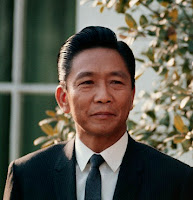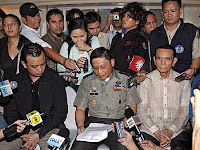Nuclear energy: too hot to handle for "macho" Filipinos
 In the aftermath of the 11th March super-earthquake that devastated Japan and caused a health and environmental crisis after damaged nuclear reactors started releasing radioactive material into the atmosphere, the Philippines remains mired in a too-little-too-late soul searching along two key areas: (1) its capability to respond in the event of a similar-sized disaster hitting its main population centres, and (2) the future of its nuclear energy program.
In the aftermath of the 11th March super-earthquake that devastated Japan and caused a health and environmental crisis after damaged nuclear reactors started releasing radioactive material into the atmosphere, the Philippines remains mired in a too-little-too-late soul searching along two key areas: (1) its capability to respond in the event of a similar-sized disaster hitting its main population centres, and (2) the future of its nuclear energy program.When one considers how Filipinos failed to learn anything from a wealth of lessons coming from past natural and man-made disasters that have hit the Philippines over the last 50 years it becomes a safe bet that Filipinos will not follow through on any (if any) outcome coming from the first soul-searching exercise. As for the second, there seems to be no evidence of any serious effort to find alternative sources of energy beyond importing more oil from a bunch of unstable Arab kingdoms. With any further will to even explore development of nuclear energy in the Philippines all but crushed, Filipinos are most likely to defer back to their renowned cultural comfort zones bahala na ("come what may") and pwede na yan ("that'll do").
And yet, despite Filipinos' strong tradition of complacency, low-thinking-applied reaction is the order of the day amongst a substance-starved population. The Inquirer editor calls it a "history of overreaction"...
In the same way that the first Persian Gulf war in 1991 led anxious Filipinos, thousands of miles away from any possible danger, to empty grocery shelves, anxious Filipinos have been passing improbable rumors about radiation from Japan reaching Philippine shores. Only this time, the misinformation multiplied at the speed of SMS.
Some text messages contained suggested remedies to use in case of radiation, such as the popular Betadine. Some purported to quote news organizations, such as the BBC. Some even pinpointed the time the first wave of radiation would arrive: 4 p.m.
Of course, this is not surprising for a supposedly 21st Century society living in a world of unprecedented access to information that has a renowned track record of deferring their sensibilities to superstition, religious dogma, the uninformed edicts of pastors and clerics, grandstanding politicians, street mobs, and "social media" chatter.
Columnist Randy David in a particularly brilliant burst of insight (just incrementally beyond his usual brilliant form) hits the nail on the head as far as pinpointing the stark difference in demeanor between substance-deficited societies like the Philippines and all-around wealthy ones like Japan:
Japan, a big user and producer of nuclear plants, became a leader in the industry—an amazing achievement for a nation that had been traumatized by the destructive application of nuclear power in wartime.
In short, a nation that had been history's first and so far only targetted victim of a premeditated nuclear bombardment simply went on to develop a vast nuclear energy generation capability regardless.
That puts a bit of context behind the laughable sight of Filipinos running around squealing and shrieking over rumours of radioactive apocalypse. Japan's ability to look to the future with unmatched lucidity even as it faces the challenge of coming to terms with the immense tragedy of today is a bright beacon of courage and grace shining upon all of humanity. Certainly it is a grace that puts Filipinos' utter lack of grace in perspective. But I prefer to defer yet again to Mr David's words to highlight this point...
Risk-taking is a feature of modern societies. Traditional societies, in contrast, tend to be too intimidated by life’s many dangers—i.e., to losses due to external forces—as to be inclined to forgo many opportunities. In our case, this conservative attitude seemed to be changing, albeit slowly. But, after Fukushima, one doubts very much if Filipinos would be willing to even listen to former Rep. Mark Cojuangco passionately argue the case for the activation of the mothballed [Bataan Nuclear Power Plant].
Filipinos, in all ironies, are renowned for their noisy and colourful bravado. Everything from the Philippine National "Debate" down to idle alcohol-fuelled discussion in beer houses is dominated by lots of banter about imagined conquests, self-described virility, and loud use of big words -- perhaps to mask an inner flaccidity, profound insecurity over a vast wasteland where results should have been, and a penchant for shrieky national panic attacks -- all evidence of a hopelessly virulent adolescent mind that defies all national efforts to outgrow it.
Contrast this with Japan where clean lines, sober stoicism, and quiet achievement define the national character.




Even if any progress were made in activating the Bataan Nuclear Power Plan, would the average set of Filipinos be intellectually and passionately capable of managing a high-risk enterprise?
ReplyDeleteThe "Filipino time," of even five (5) minutes can have disastrous effects! How about our supposedley lack of attention to detail?
alfred... a definite NO. the philippines is not capable of running complex systems such as nuclear power plants. we can't even run a decent public transport system or build 100% filipino-made (not assembled) cars. quality is not a trait that filipinos have. unless they are directly supervised by foreign management systems... that is why, we have many engineers working abroad as ofw's, but no filipino engineering company have made it in into the international industrial scene. as an individual we can, especially when influenced by foreign dictates... but collectively, filipinos are doomed to fail at anything... except making "welgas"!
ReplyDeletehttp://www.youtube.com/watch?v=9KIYlVM7ul4
ReplyDeletewatch!
It's these kind of articles that make me wonder what good opening up the media to FDI will do for our culture, especially with international media still keeping their eyes glued for the next big ratings tragedy.
ReplyDeleteI don't think the foreign investors in media will want to improve the actual quality of the programming as they will simply try to give us better "quality" of the programming they believe we enjoy watching. Wrapping shit in prettier paper, as it were. Like perhaps making our telenovelas 'export-quality' like the Taiwanovela or Koreanovela.
Well to be fair, if you observe what is going on with the British and US media, they have in recent times been trying to drum up interest in the coming royal wedding of Prince William and Kate what's-her-face.
ReplyDeleteFrom what I've read among observers of the media over there, the public interest in that circus has so far been disappointing.
That's another example of the media trying to create news rather than just report it.
Well, if it earns the ratings then they'll stick with it. If not, they'll move onto another potential tragedy, such as the Japan and Libya crises.
ReplyDeleteI think they realize that playing to fear does get ratings though. Although (despite taking "official" word with a salt shaker) they appear to have the situation almost under control:
http://www.bbc.co.uk/news/world-asia-pacific-12793925
...the media is still very much playing the Chernobyl card. Everyone's still glued to their screens.
From there, I've observed is that often times successful shows are built around these contemporary themes or 'memes.' Like Burn Notice being built around hot-button global politics and subterfuge made even more popular since Wikileaks.
So it would be safe to assume that foreign investors looking to go into OUR media would try to figure out what WE like based on how we react to things and then build on THAT with ratings in mind.